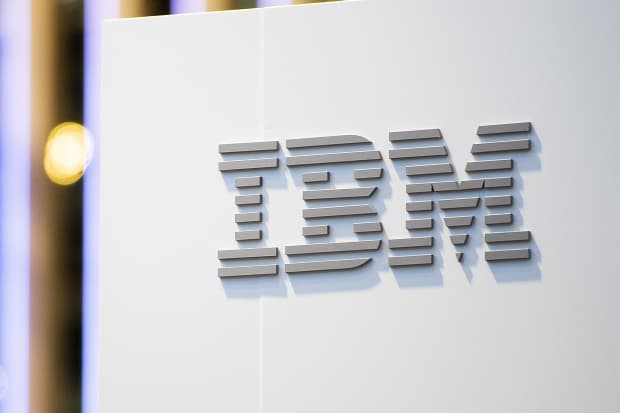This post was originally published on this site

International Business Machines Corp. reported third-quarter earnings Monday afternoon.
(Getty Images)
International Business Machines Corp. shares dove more than 5% in Tuesday trading, after the tech company reported its lowest quarterly revenue total in more than 23 years.
IBM IBM, -5.79% reported third-quarter sales just shy of $7.6 billion on Monday afternoon, its lowest sales for a three-month period since the first quarter of 1997, according to FactSet records. Shares opened Tuesday morning at $119.80, 4.6% lower than Monday’s close, and moved as low as $117.07 through the morning trading session, which ended at noon Eastern time with shares at $118.10, 5.9% lower.
Analysts were mixed in their responses to the report, with no ratings changes, three price target increases and three price-target declines tracked by FactSet. None of the analysts saw a strong path to revenue gains, however, as IBM plots a spinoff of one of its large divisions and its Red Hat acquisition struggling for growth.
Chief Executive Arvind Krishna said Monday afternoon that executives “expect to deliver sustainable mid-single-digit revenue growth upon completion of the separation.” MoffetNathanson analysts noted, however, that IBM promised mid-single-digit revenue growth in 2020 and 2021 after the acquisition of Red Hat in 2019, but has failed to succeed in that effort so far.
“No one could have anticipated a pandemic, of course, but the return to revenue growth has long been an elusive goal for IBM, e.g., for several years, IBM disclosed the size and growth rates of the company’s ‘strategic imperatives’ (which consistently grew in the double-digits), with the implication that IBM’s revenue growth would naturally turn positive over time, due to mix effects,” the analysts wrote, while maintaining a sell rating and $125 price target. “That didn’t happen, and IBM eventually stopped reporting those measures.”
Still, those analysts say the revenue-growth forecast is not impossible.
“In our view, that outlook – which, per CEO Arvind Krishna, includes some contribution from M&A – is not a pipe dream, but not easy either,” they wrote.
Profit is also a concern, as IBM faces multibillion-dollar charges for its restructuring.
“In the short term we believe consensus Q4 EPS and cash flows will move lower and there is risk that the seasonal Q4 budget spend may not materialize to the full extent as it has in the past,” Citi analyst Jim Suva wrote while maintaining a neutral rating and $140 price target.
Most analysts issued a “wait-and-see” approach for IBM, as more details about its path forward in the spinoff are expected.
“Given the 12-14 month spinoff timeline and required restructuring in Q4:20, investors will likely “write-off” the rest of CY20 and focus on CY21 and CY22 pro forma estimates,” UBS analysts wrote, while maintaining a neutral rating and $125 price target.
“Overall, we think investors will wait to get a better sense on a) financial metrics across Remain and Spin-co (more financial details needed), b) Clarity around the $2.3B cost reduction plan and how it flows to the bottom line, c) path to stabilization of software revenues (down mid single digits ex-RHT) and d) Shift in capital allocation and sizing up M&A potential as we move forward,” Evercore ISI analyst Amit Daryanani wrote, while maintaining a hold rating and decreasing his price target to $135 from $137.
Overall, four of 15 analysts tracked by FactSet consider IBM a buy, while nine rate the stock the equivalent of a hold and two recommend selling the stock. The average price rating as of Tuesday morning was $136.54, according to FactSet.
IBM shares have declined 8.5% so far this year, as the Dow Jones Industrial Average DJIA, +1.05%, which counts IBM as a component, has gained 0.6%.

